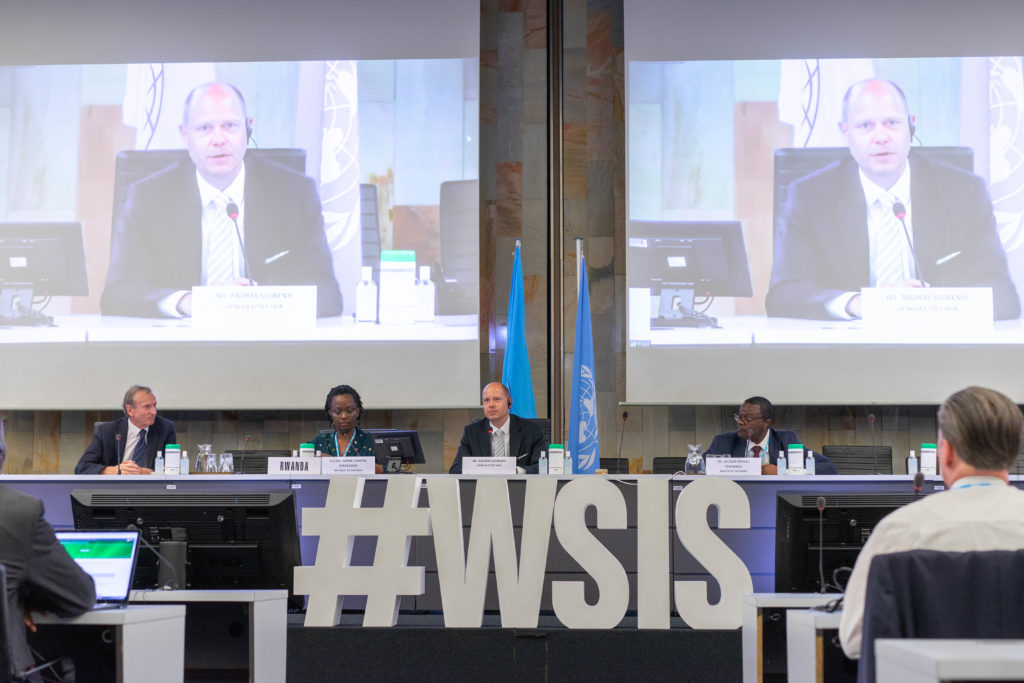The Mayors’ High-Level Dialogue on Smart Cities, Drivers of Innovative Sustainable Development at the WSIS2022 on 30 May 2022 was a great success. Mayors, city network leaders and ICT experts shared their experiences on how to drive smart innovation and build inclusive cities and accelerate digital transformation to improve the lives of citizens. Sustainable Development Goals (SDGs), including SDG11, cannot be achieved without the engagement and development of cities. The Geneva Cities Hub was honored to co-organize and co-moderate this WSIS panel.
Participants agreed that we need to build people-centered smart sustainable cities, and that technology is not an outcome in itself, but a tool to offer better services for citizens. Closing the digital divide is considered a precondition to build smart cities that help achieve the SDGs. Speakers elaborated on how digitalized services and the use of ICTs advance sustainable development in their communities. Best practices from different areas of life – such as e-education, e-health, digitalization of services, collection of data on consumption and waste management – were shared. Local leaders underlined the need to find solutions to the local challenges, keeping in mind a people-centered approach.
Mayors, ambassadors, experts and business representatives offered a unique mix of views to foster cooperation and advance urban digital transformation. It ranged from building ICT infrastructure, through better online services to developing a smart city master-plan and using digital twin cities. The future web3 with special computing will offer huge opportunities. Digital transformation is now critical to meeting the demands of sustainable urban development. Innovations like the sharing economy, open data, and digital platforms have changed how people participate in social life.
Several speakers emphasized how ICTs and emerging technologies can help accelerate digital transformation and make cities inclusive. Public private partnerships (PPP) need to be developed further to include the “4th P”: the people. It was interesting to observe the differences and complementarities of the actions and policies required at the national and city levels to promote sustainable development. This interactive dialogue offered valuable input to better understand how UN entities can help cities and communities drive innovative sustainable development.
Thanks to our keynote speaker, all our panellists and the co-moderator:
Mr. Malcolm Johnson – Deputy secretary General of ITU, H.E. Mrs. Marie Chantal Rwakazina – Permanent Representative of Rwanda, Mr. Jacquis Kemleu Tchabgou – Mayor of Dschang, Mr. Axel Grael – Mayor of Niteròi, Mr. Stéphane Valli – Mayor of Bonneville, Mr. Rajoma Ignace – Deputy Mayor of Fianarantsoa, Mr. Eugenio Di Sciascio – Deputy Mayor of Bari, Ms. Carla Alexandra Castelo – Councillor at Oeiras, Mr. Theo Blackwell – Chief Digital Officer of London, Ms. Jung Sook Park – Secretary general of WeGO, Mr. Jordi Vaquer – Secretary General of Metropolis, Mr. Seyed Mehdi Badiei – CEO of ICTO, Mr. Salar Shahna – CEO of World XR Forum, Mr. Omar Al Shaiba – ED of ITAS, Mr. Mohamed Husain Karmastaji – ED of ITSS and Mr. Bilel Jamoussi – Chief SDG ITU
If you are interested in more good practices at local level, please visit Geneva Cities Hub’s Mayors’ Action Platform.

